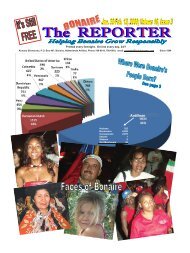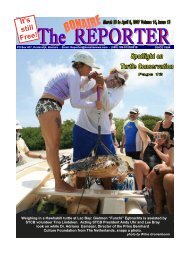Create successful ePaper yourself
Turn your PDF publications into a flip-book with our unique Google optimized e-Paper software.
he chart below is from an online<br />
T survey completed by 1,982 divers<br />
conducted in early 2004 and shows<br />
the conditions sited by 383 divers who<br />
cancelled dives in 2003 for medical<br />
reasons. <strong>The</strong> total is more than 100%<br />
because some divers cancelled dives for<br />
more than one medical reason. David<br />
Colvard M.D.<br />
Cold/Upper Respiratory Infection<br />
Flu/Fever<br />
Recent Surgery<br />
Back Pain<br />
Broken Bone(s)<br />
Motion Sickness<br />
Dental Pain<br />
DCI or DCS Symptoms<br />
Cuts/Lacerations-Stitches<br />
Headaches-Migraine<br />
Marine Animal/Life Injury (Bites-Cuts-Scrapes-Stings)<br />
1.3%<br />
0.8%<br />
0.8%<br />
0.5%<br />
0.3%<br />
1.8%<br />
1.8%<br />
1.6%<br />
<strong>Bonaire</strong> <strong>Reporter</strong> - December 29 to January 5, 2007<br />
2.9%<br />
2.3%<br />
2.3%<br />
2.1%<br />
Barracuda photo by Albert Bianculli<br />
B eginning<br />
with the<br />
June 2000 <strong>Bonaire</strong><br />
Dive Festival,<br />
David F. Colvard,<br />
M.D., a private<br />
psychiatrist and<br />
clinical investigator David Colvard<br />
in Raleigh NC, a<br />
divemaster, and a Sand Dollar Condominium<br />
Resort home-owner, has been conducting<br />
online surveys of thousands of divers around<br />
the world. His first study on diver panic in<br />
Medical Reasons Divers Cancelled Dives in 2003*<br />
6.5%<br />
5.2%<br />
8.6%<br />
10.4%<br />
10.2%<br />
16.4%<br />
14.1%<br />
over 12,000 divers was sponsored by Rodale’s<br />
Scuba Diving magazine and was supported by<br />
Drew Richardson at PADI. Dr. Colvard presented<br />
a poster and abstract at the 35 th Undersea<br />
and Hyperbaric Medical Society Scientific<br />
Meeting in San Diego, CA, in June 2002. He<br />
and his wife Dr. Lynn Colvard, wrote A Study<br />
of Panic in Recreational Divers for <strong>The</strong> Undersea<br />
Journal, (Professional Journal of Professional<br />
Association of Diving Instructors),<br />
which was the feature article in the winter<br />
quarter 2003 issue. He has continued to conduct<br />
follow up online surveys of those divers<br />
and others on a variety of topics, including<br />
PTSD in the divers who survived the Decem-<br />
20.9%<br />
0.0% 10.0% 20.0% 30.0% 40.0% 50.0% 60.0%<br />
(*Total is more than 100% because some divers had more than one problem.)<br />
id You Know… D Barracudas ‘dress’ for their grooming<br />
appointments?<br />
Barracudas, if large enough, can inspire fear and<br />
respect in the bravest of adventurers. But when it<br />
comes time for their cleaning, barracudas are as<br />
gentle as pussycats. If you’ve ever seen a barracuda<br />
turn very dark (instead of its normal silver<br />
color) and hover over a coral head, then you’ve<br />
witnessed a barracuda getting cleaned. Many fish<br />
change colors as a cue to cleaners that they’re<br />
ready for their daily (or hourly) grooming. <strong>The</strong><br />
ber 2004 Southeast Asian tsunami. Dr. Colvard<br />
recently completed a study of middle ear<br />
pressure equalization using SINUS RINSE<br />
for NeilMed Pharmaceuticals and represented<br />
the company at DEMA Show in Orlando. He<br />
has made several presentations to the staff of<br />
Divers Alert Network at Duke University<br />
Medical Center and is frequently quoted in<br />
Scuba Diving magazine and elsewhere. He<br />
hosts the website www.DivePsych.com which<br />
provides evidence-based information for divers<br />
on psychological and stress factors in<br />
scuba divers. For fun David enters underwater<br />
photography competitions.<br />
56.1%<br />
difficult part about understanding<br />
fish behavior<br />
is that you must be<br />
familiar with the fish’s normal coloration to be<br />
aware that they have changed colors and that indeed<br />
something interesting is taking place. <strong>The</strong>n<br />
you can observe the fish and search for the tiny<br />
cleaners flitting about on the fish’s body or in and<br />
out of its mouth or gills. Now if you see a barracuda<br />
all dressed up in his ‘cleaning suit’, you<br />
know what’s going on. Caren Eckrich<br />
Biologist Caren Eckrich founded and runs<br />
Sea & Discover, <strong>Bonaire</strong>'s marine education<br />
center specializing in guided dives and<br />
snorkels for adults and adventure programs<br />
for kids. You may call her at 717-5322.<br />
Page 9

















